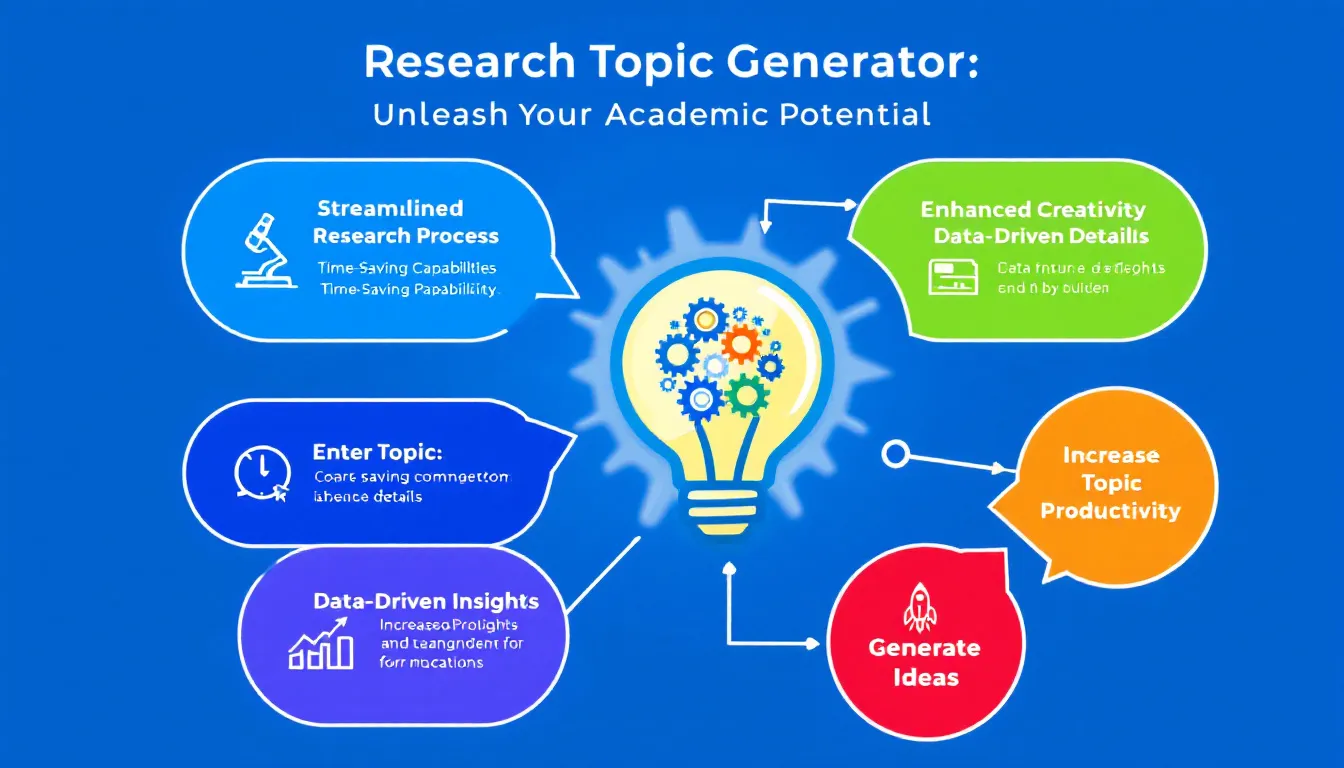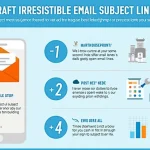Is this tool helpful?
How to Use the Research Topic Generator Tool Effectively
To make the most of our Research Topic Generator Tool, follow these simple steps:
- Enter the main topic: In the first field, input the primary subject area for which you need research questions. For example, you might enter “Artificial Intelligence” or “Sustainable Agriculture”.
- Specify the number of questions (optional): If you have a specific number of research questions in mind, enter it in the second field. This can be any number between 1 and 10. If left blank, the tool will generate 5 questions by default.
- Add a specific focus (optional): If you want to narrow down your research area, use the third field to specify a subtopic or aspect within your main topic. For instance, if your main topic is “Renewable Energy,” you might enter “Solar Panel Efficiency” as a specific focus.
- Generate topics: Click the “Generate Research Topics” button to process your request.
- Review the results: Once generated, the research topics will appear in the results section below the form. Each topic will include a brief description and rationale.
- Copy the results: If you want to save or share the generated topics, use the “Copy to Clipboard” button to easily transfer the text to another document or application.
By following these steps, you’ll be able to quickly generate unique and relevant research topics tailored to your specific area of interest.
Revolutionizing Research: The Power of AI-Driven Topic Generation
In the ever-evolving landscape of academic research, finding novel and impactful research questions can be a daunting task. Our Research Topic Generator Tool harnesses the power of artificial intelligence to streamline this process, offering researchers, students, and academics a powerful ally in their quest for knowledge.
This innovative tool is designed to spark creativity and inspire exploration in various fields of study. By leveraging advanced natural language processing and machine learning algorithms, it generates unique, relevant, and thought-provoking research topics based on user inputs. The tool’s primary purpose is to assist users in identifying unexplored areas within their field of interest, potentially leading to groundbreaking studies and contributions to the existing body of knowledge.
Key Features and Benefits
- Customization: Users can tailor the tool to their specific needs by inputting a main topic, desired number of questions, and even a specific focus area.
- Efficiency: Save hours of brainstorming and literature review by generating multiple research topics in seconds.
- Inspiration: Uncover new perspectives and angles within your field of study that you might not have considered otherwise.
- Interdisciplinary approach: The AI considers connections between various fields, potentially leading to innovative cross-disciplinary research ideas.
- Up-to-date relevance: The tool’s knowledge base is regularly updated, ensuring that generated topics reflect current trends and gaps in research.
Unlocking Research Potential: Benefits of Using the Topic Generator
The Research Topic Generator Tool offers a myriad of benefits for researchers at all levels, from undergraduate students to seasoned academics. Let’s explore some of the key advantages:
1. Time-Saving Efficiency
One of the most significant benefits of using this tool is the considerable time savings it offers. Traditional methods of topic ideation often involve hours of literature review, discussions with peers, and individual brainstorming sessions. Our AI-powered generator can produce a list of potential research topics in mere seconds, allowing researchers to allocate more time to other critical aspects of their work, such as methodology design and data collection.
2. Overcoming Creative Blocks
Even experienced researchers sometimes face creative blocks when trying to formulate new research questions. The Topic Generator serves as a catalyst for creativity, offering fresh perspectives and unexpected angles on familiar subjects. By presenting users with a diverse range of potential topics, the tool helps overcome mental barriers and stimulates innovative thinking.
3. Expanding Research Horizons
The AI’s vast knowledge base allows it to make connections across different disciplines, potentially leading to groundbreaking interdisciplinary research ideas. This feature is particularly valuable in today’s academic landscape, where some of the most impactful studies often emerge at the intersection of multiple fields.
4. Staying Current with Research Trends
The Topic Generator’s algorithms are designed to consider recent developments and emerging trends within various fields of study. This ensures that the generated topics are not only novel but also relevant to current academic discourse, increasing the potential impact of the resulting research.
5. Enhancing Research Quality
By providing a wide array of potential research questions, the tool allows researchers to critically evaluate and refine their focus. This process of consideration and selection can lead to more robust and well-defined research objectives, ultimately enhancing the quality of the final study.
Addressing User Needs: How the Topic Generator Solves Research Challenges
The Research Topic Generator Tool is specifically designed to address common challenges faced by researchers, students, and academics in the early stages of their projects. Let’s examine how this innovative tool tackles these issues:
1. Overcoming the “Blank Page” Syndrome
Many researchers struggle with the initial phase of topic selection, often feeling overwhelmed by the vast possibilities or unsure where to begin. The Topic Generator eliminates this problem by providing a starting point for further exploration. For example, if a user inputs “Climate Change” as the main topic, the tool might generate the following research questions:
- “How does urban heat island effect influence local climate change adaptation strategies in megacities?”
- “What is the impact of climate change on the migration patterns of pollinator species in tropical ecosystems?”
- “How do changing precipitation patterns due to climate change affect groundwater recharge rates in arid regions?”
These generated topics serve as springboards for further refinement and development, helping researchers overcome the initial hurdle of topic selection.
2. Identifying Research Gaps
One of the most challenging aspects of research is identifying gaps in the existing literature. The Topic Generator’s algorithms are designed to analyze current research trends and identify areas that have not been extensively explored. This feature helps researchers focus on truly novel questions that have the potential to make significant contributions to their field.
3. Balancing Specificity and Breadth
Striking the right balance between a specific focus and a broader perspective can be difficult. The tool addresses this by allowing users to input both a main topic and a specific focus area. For instance, if a user enters “Renewable Energy” as the main topic and “Energy Storage” as the specific focus, the tool might generate questions like:
- “How do different battery chemistries affect the long-term efficiency of grid-scale energy storage systems for renewable energy integration?”
- “What are the environmental impacts of large-scale pumped hydro storage facilities in regions with water scarcity issues?”
- “How can thermal energy storage technologies be optimized for use in concentrated solar power plants to improve overall system efficiency?”
These questions demonstrate how the tool can generate topics that are both specific to the focus area and relevant to the broader field of study.
4. Encouraging Interdisciplinary Research
In today’s complex research landscape, some of the most innovative breakthroughs occur at the intersection of multiple disciplines. The Topic Generator’s vast knowledge base allows it to make connections across different fields, encouraging interdisciplinary approaches. For example, a researcher interested in “Artificial Intelligence” might receive a suggestion like:
“How can AI-driven natural language processing techniques be applied to analyze historical texts for insights into long-term sociocultural changes?”
This question combines elements of artificial intelligence, linguistics, history, and sociology, potentially leading to a novel interdisciplinary study.
Practical Applications: Real-World Examples of the Topic Generator in Action
To better understand the versatility and effectiveness of the Research Topic Generator Tool, let’s explore some practical examples of how it can be used across different academic disciplines:
1. Environmental Science
Input:
- Main Topic: Marine Pollution
- Specific Focus: Microplastics
- Number of Questions: 3
Generated Topics:
- “How do different shapes and sizes of microplastics affect their bioaccumulation in marine food webs?”
- “What are the potential long-term effects of microplastic ingestion on the reproductive health of deep-sea organisms?”
- “How effective are current wastewater treatment technologies in removing microplastics from urban runoff before it reaches marine environments?”
These questions provide a researcher with specific, unexplored angles within the broader topic of marine pollution, focusing on the critical issue of microplastics.
2. Psychology
Input:
- Main Topic: Social Media
- Specific Focus: Mental Health
- Number of Questions: 3
Generated Topics:
- “How does the frequency of social media use correlate with changes in cortisol levels and perceived stress among adolescents?”
- “What is the impact of social media-induced FOMO (Fear of Missing Out) on sleep quality and cognitive performance in young adults?”
- “How do different types of social media interactions (e.g., passive scrolling vs. active engagement) affect self-esteem and body image in diverse cultural contexts?”
These research questions combine elements of psychology, neuroscience, and social media studies, offering researchers novel avenues to explore the complex relationship between social media use and mental health.
3. Computer Science
Input:
- Main Topic: Quantum Computing
- Specific Focus: Cryptography
- Number of Questions: 3
Generated Topics:
- “How can post-quantum cryptographic algorithms be optimized for implementation on resource-constrained IoT devices?”
- “What are the potential vulnerabilities of quantum key distribution systems to side-channel attacks, and how can they be mitigated?”
- “How does the integration of quantum-resistant cryptographic protocols impact the performance and scalability of blockchain networks?”
These questions demonstrate how the tool can generate highly technical and specific research topics within a cutting-edge field, helping researchers stay at the forefront of technological advancements.
Frequently Asked Questions (FAQ)
Q1: How does the Research Topic Generator Tool work?
A1: The tool uses advanced natural language processing and machine learning algorithms to analyze the user’s input (main topic, specific focus, and desired number of questions) and generate relevant, unique research topics. It draws upon a vast database of academic knowledge and current research trends to produce questions that are both novel and pertinent to the field of study.
Q2: Can I use the generated topics for my actual research?
A2: Absolutely! The topics generated by the tool are designed to be starting points for your research. However, it’s important to further develop and refine these ideas, ensuring they align with your specific interests, available resources, and academic requirements.
Q3: How often is the tool’s knowledge base updated?
A3: The tool’s knowledge base is regularly updated to reflect the latest developments and trends in various fields of study. This ensures that the generated topics remain relevant and aligned with current academic discourse.
Q4: Can the tool generate topics for interdisciplinary research?
A4: Yes, the tool is capable of generating interdisciplinary research topics. Its algorithms are designed to make connections across different fields of study, potentially leading to innovative research ideas that bridge multiple disciplines.
Q5: Is there a limit to how many times I can use the tool?
A5: There are no set restrictions on the number of times you can use the Research Topic Generator Tool. Feel free to use it as often as needed to explore different research possibilities and refine your ideas.
Q6: How can I ensure the originality of the research topic I choose?
A6: While the tool generates unique combinations of ideas, it’s always important to conduct a thorough literature review to ensure the originality of your chosen topic. Use the generated topics as a starting point, then delve deeper into existing research to refine and develop your specific research question.
Q7: Can the tool generate topics for all academic disciplines?
A7: The Research Topic Generator Tool is designed to cover a wide range of academic disciplines. However, its effectiveness may vary depending on the specificity of the field. For highly specialized or niche areas, you may need to use broader terms in your input and then narrow down the generated topics to fit your specific area of study.
Q8: How should I choose between the multiple topics generated by the tool?
A8: When selecting from the generated topics, consider factors such as:
- Your personal interest in the topic
- The feasibility of conducting research on the topic (considering available resources and time)
- The potential impact and relevance of the research
- The alignment with your academic or professional goals
- The current state of research in the area (Is there a gap in the literature that this topic could address?)
Q9: Can I combine multiple generated topics into a single research question?
A9: Absolutely! In fact, combining elements from different generated topics can lead to even more innovative and unique research questions. Feel free to mix and match ideas, or use the generated topics as inspiration to formulate your own unique research question.
Q10: How can I provide feedback on the Research Topic Generator Tool?
A10: We value user feedback as it helps us continually improve the tool. If you have suggestions, comments, or encounter any issues while using the Research Topic Generator, please contact our support team through the provided channels on our website.
Important Disclaimer
The calculations, results, and content provided by our tools are not guaranteed to be accurate, complete, or reliable. Users are responsible for verifying and interpreting the results. Our content and tools may contain errors, biases, or inconsistencies. We reserve the right to save inputs and outputs from our tools for the purposes of error debugging, bias identification, and performance improvement. External companies providing AI models used in our tools may also save and process data in accordance with their own policies. By using our tools, you consent to this data collection and processing. We reserve the right to limit the usage of our tools based on current usability factors. By using our tools, you acknowledge that you have read, understood, and agreed to this disclaimer. You accept the inherent risks and limitations associated with the use of our tools and services.







